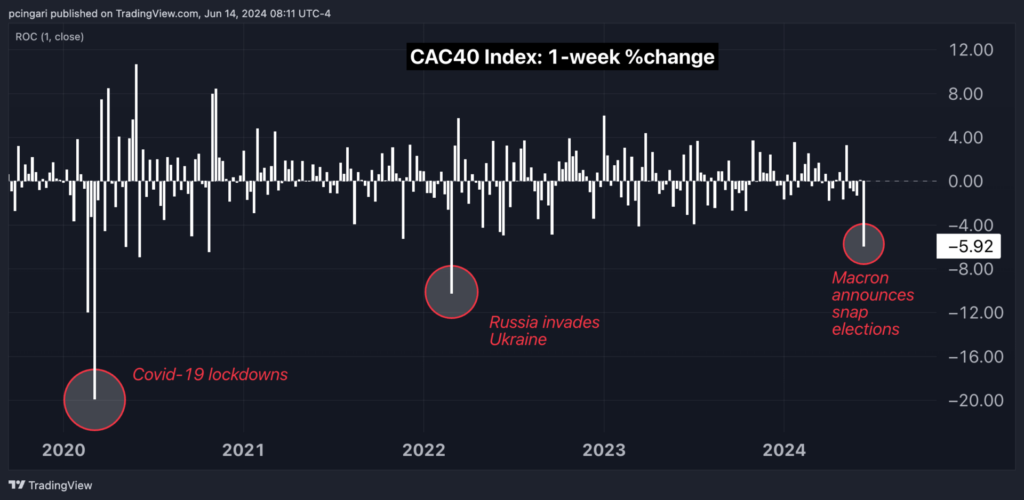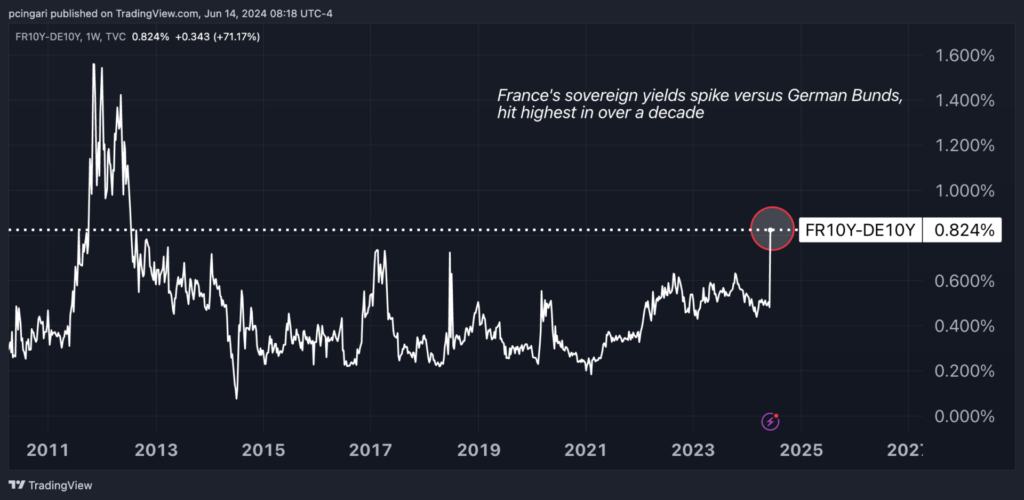Zinger Key Points
- French stock market faces worst weekly performance since February 2022 due to snap election uncertainties.
- Major banking stocks plummet: BNP Paribas down 13% for the week, Societe Generale down 16%.
- Feel unsure about the market’s next move? Copy trade alerts from Matt Maley—a Wall Street veteran who consistently finds profits in volatile markets. Claim your 7-day free trial now.
The French stock market is on track to register its worst weekly performance since late February 2022.
Following the announcement of snap elections last Sunday, the Paris CAC 40 index — as tracked by the iShares MSCI France Index Fund EWQ — fell by 2.4% at 8:10 a.m. ET, heading into the final hours of the European session.
On a weekly basis, the decline extends to 6%, marking the worst performance since late February 2022, when Russia’s invasion of Ukraine triggered a drop of over 10% for the CAC 40.
Chart: France Equities Tumble The Most Since Russian Invasion Of Ukraine

Risks Of Broader Contagion
The main declines this week are among banking stocks, hit by the wave of sell-offs due to political uncertainties. France’s largest financial institution, BNP Paribas, fell over 13%, while Societe Generale is down by over 16% this week.
An exchange-traded fund tracking broader European financial institutions – the iShares MSCI Europe Financials ETF EUFN – is down by 7% for the week, indicating that France’s political risks are spreading throughout the region.
The broader iShares MSCI Eurozone ETF EZU fell 4.6% this week, on track for its worst week since September 2022.
The euro fell by 0.5% on Friday and by over 1% for the week, eyeing its worst weekly performance in over two months.
“The risk premium in European assets could build further,” Chris Turner, global head of markets at ING analyst, wrote on a note Friday.
Why Are French And European Assets Tumbling This Much?
The decisive victory of Marine Le Pen’s far-right National Rally party in last Sunday’s European Parliament elections led President Emmanuel Macron to dissolve the French National Assembly and call for new parliamentary elections. France will vote in the first round in two weeks, followed by a runoff on July 7.
With a budget deficit already particularly high at around 6%, investors fear the risk of French fiscal accounts deteriorating further if Le Pen’s party secures a majority in the national parliament.
According to ING, "Frexit" is no longer seen as a risk, but markets are jittery ahead of the snap parliamentary election.
In addition to far-right-wing fears, French left-wing parties are forming a coalition to run a single candidate per district, which could further erode support for President Macron’s party.
The yields on French 10-year government bonds have been trending upward, and the spread with the German Bund has shot up to 83 basis points, the highest level since July 2012.

Image: Pixabay
Edge Rankings
Price Trend
© 2025 Benzinga.com. Benzinga does not provide investment advice. All rights reserved.
Trade confidently with insights and alerts from analyst ratings, free reports and breaking news that affects the stocks you care about.